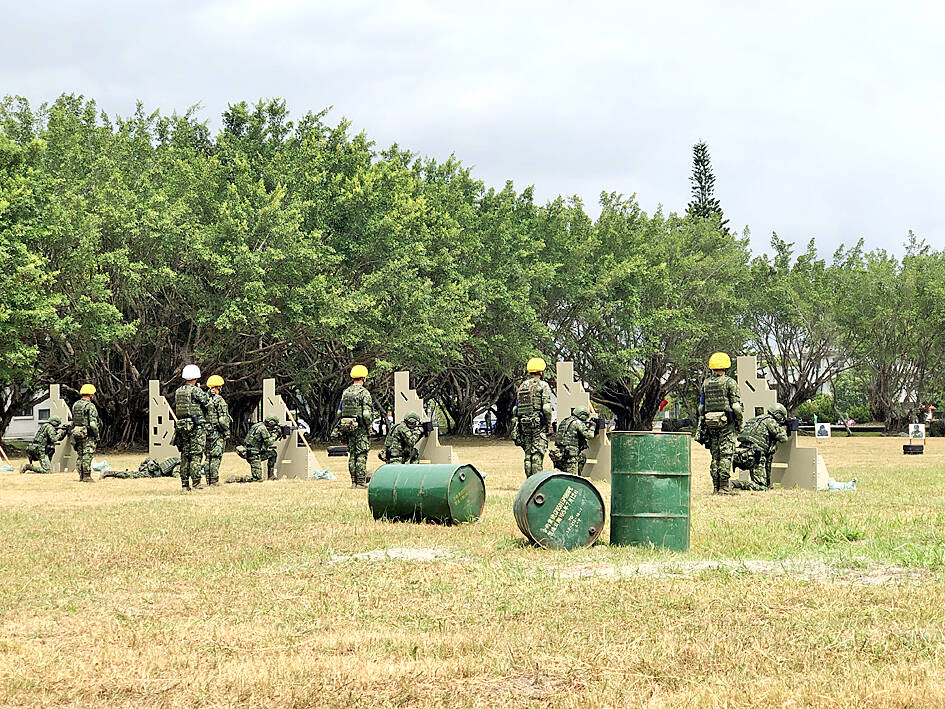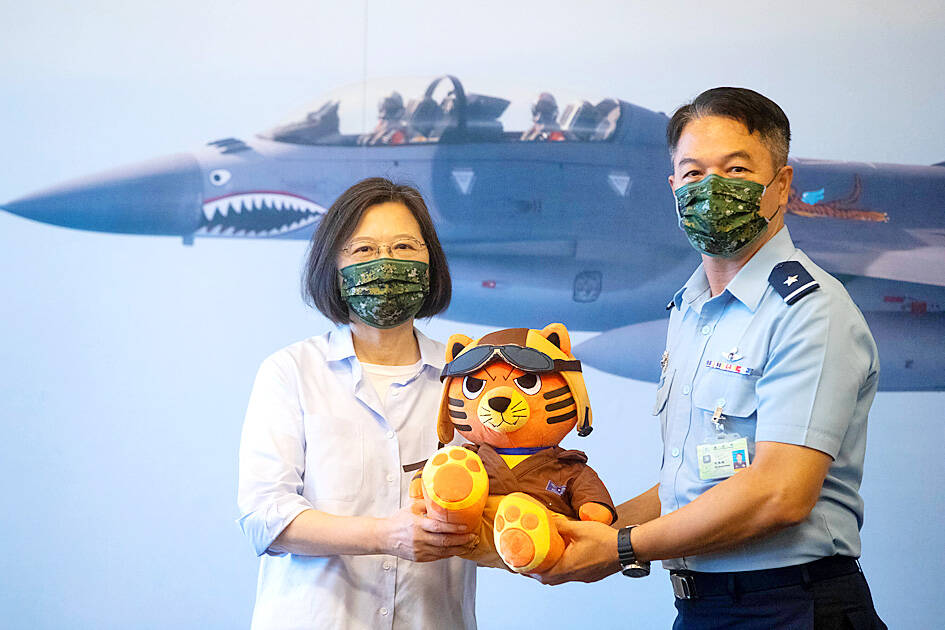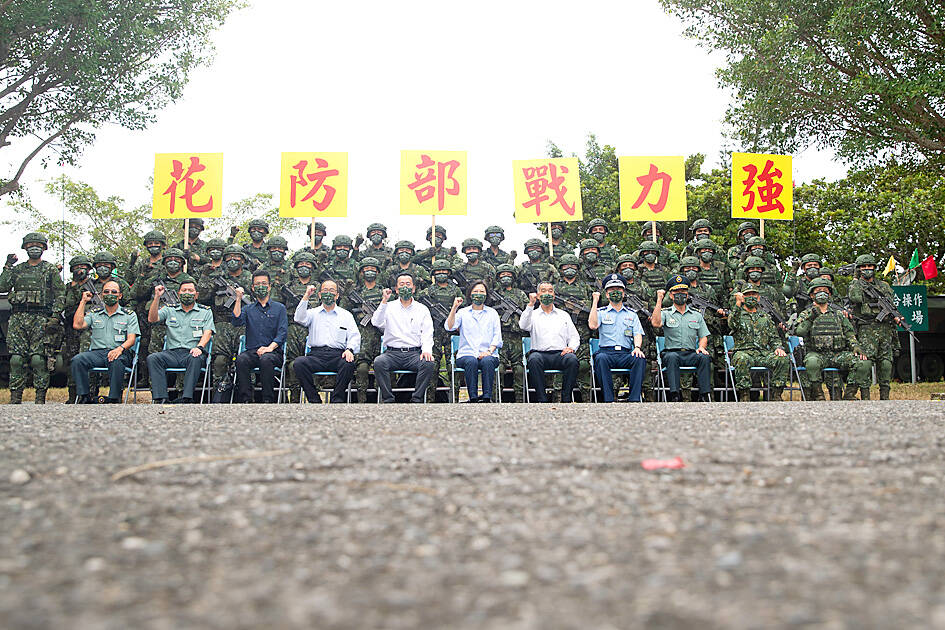The military is now better prepared and its combat skills are “more mature” after repeatedly scrambling to see off Chinese forces during their recent drills, President Tsai Ing-wen (蔡英文) said yesterday.
She was speaking to air force personnel at Hualien Air Force Base, including the 613 Battalion and Fifth Tactical Composite Wing, while touring military bases ahead of the Mid-Autumn Festival to present holiday bonuses.
She also visited the navy’s Hai Feng Seventh Squadron’s Guhai Base.

Photo: Chen Yun, Taipei Tmes
The Chinese threat persists, Tsai said.
Over the past month, the Fifth Wing has been on standby night and day, and has flown 36 sorties in response to Chinese aggression, she said.
“In the face of challenges, our military has calmly responded to the enemy’s attempts at intrusion and has tenaciously defended the nation’s security,” the president said, according to a transcript of her remarks released by the Presidential Office.

Photo: CNA
“I believe that after this period of combat-readiness missions, our military’s combat skills are more mature and its combat power is more powerful,” she said.
Giving special recognition to Captain Chou Wan-chun (周婉淳), Tsai said that she flew several sorties, demonstrating that regardless of gender, military branch or position, every soldier and officer shoulders the responsibility to protect their country.
Tsai added that she was “extremely proud” of the armed forces and people can enjoy the Mid-Autumn Festival because of their service.

Photo: CNA
During her speech, Tsai stood in front of an image of a Block-20 F-16 painted like a shark — the same design that was the trademark of the Flying Tigers, the US volunteer force during World War II.
The jet was painted during the 2015 celebration marking the 70th anniversary of the end of World War II.
Tsai also inspected the “simulated combat situation gunnery training” program being trialed at the Huadong Defense Command’s Nanpu Base in Hualien, which the military plans to implement nationwide in January.
The program is far more challenging than previous shooting exercises, said Chu Ke-yen (褚克彥), captain of the Mechanized Infantry Battalion’s Second Company.
Soldiers during exercises usually remain stationary in set stances, but the program requires them to seek cover and alternate between shooting upright, on one knee and in a prone position.
Chu said that all soldiers received one “dummy” round in their magazine to simulate jamming to test if they remember how to deal with malfunctions and eject the faulty round.
Yesterday’s training simulated firing when closing in on an enemy position, requiring soldiers to shoot at 175m and 75m respectively, Chu said.
The military is also holding two days of drills, which started late yesterday, around Hengchun Peninsula. Apache attack helicopters, Ching-kuo Indigenous Defense Fighters, artillery and drones are to be used in the drills.
The president’s tour came as three more Chinese fighter jets crossed the median line of the Taiwan Strait, the Ministry of National Defense said.

Right-wing political scientist Laura Fernandez on Sunday won Costa Rica’s presidential election by a landslide, after promising to crack down on rising violence linked to the cocaine trade. Fernandez’s nearest rival, economist Alvaro Ramos, conceded defeat as results showed the ruling party far exceeding the threshold of 40 percent needed to avoid a runoff. With 94 percent of polling stations counted, the political heir of outgoing Costa Rican President Rodrigo Chaves had captured 48.3 percent of the vote compared with Ramos’ 33.4 percent, the Supreme Electoral Tribunal said. As soon as the first results were announced, members of Fernandez’s Sovereign People’s Party

MORE RESPONSIBILITY: Draftees would be expected to fight alongside professional soldiers, likely requiring the transformation of some training brigades into combat units The armed forces are to start incorporating new conscripts into combined arms brigades this year to enhance combat readiness, the Executive Yuan’s latest policy report said. The new policy would affect Taiwanese men entering the military for their compulsory service, which was extended to one year under reforms by then-president Tsai Ing-wen (蔡英文) in 2022. The conscripts would be trained to operate machine guns, uncrewed aerial vehicles, anti-tank guided missile launchers and Stinger air defense systems, the report said, adding that the basic training would be lengthened to eight weeks. After basic training, conscripts would be sorted into infantry battalions that would take

GROWING AMBITIONS: The scale and tempo of the operations show that the Strait has become the core theater for China to expand its security interests, the report said Chinese military aircraft incursions around Taiwan have surged nearly 15-fold over the past five years, according to a report released yesterday by the Democratic Progressive Party’s (DPP) Department of China Affairs. Sorties in the Taiwan Strait were previously irregular, totaling 380 in 2020, but have since evolved into routine operations, the report showed. “This demonstrates that the Taiwan Strait has become both the starting point and testing ground for Beijing’s expansionist ambitions,” it said. Driven by military expansionism, China is systematically pursuing actions aimed at altering the regional “status quo,” the department said, adding that Taiwan represents the most critical link in China’s

‘REALLY PROUD’: Nvidia would not be possible without Taiwan, Huang said, adding that TSMC would be increasing its capacity by 100 percent Nvidia Corp CEO Jensen Huang (黃仁勳) on Saturday praised and lightly cajoled his major Taiwanese suppliers to produce more to help power strong demand for artificial intelligence (AI), capping a visit to the country of his birth, where he has been mobbed by adoring fans at every step. Speaking at an impromptu press conference in the rain outside a Taipei restaurant, where he had hosted suppliers for a “trillion-dollar dinner,” named after the market capitalization of those firms attending, Huang said this would be another good year for business. “TSMC needs to work very hard this year because I need a lot